Iranian Judiciary Announces Investigation Into Killing Of Qasem Soleimani

The Deputy Chief of the Iranian Judiciary has claimed that an investigation into the killing of Qasem Soleimani, the former commander of IRGC's Quds Force, is in progress.

The Deputy Chief of the Iranian Judiciary has claimed that an investigation into the killing of Qasem Soleimani, the former commander of IRGC's Quds Force, is in progress.
Soleimani was killed in a US drone strike near Baghdad International Airport on January 3, 2020, under the order of then-President Donald Trump, who claimed Soleimani was actively planning attacks on American diplomats and service members in the region.
Kazem Gharibabadi stated, "The investigation into the crimes of suspects, including Donald Trump, Former Secretary of State Mike Pompeo, and Former US CENTCOM commander General Kenneth McKenzie, is on the agenda, and the court will start the trial and administer justice based on compelling and convincing evidence."
He further explained that the indictment related to the “assassination” of Qasem Soleimani was issued several months ago and has been submitted to the court.
“Currently, preparations for the trial are underway, with expectations that trial sessions will commence within the next two to three months.”
Since Soleimani’s killing, a member of the Iranian Revolutionary Guard was charged with planning to assassinate John Bolton, the former US National Security Advisor, in retaliation for the military commander’s death. Former Secretary of State Mike Pompeo was also identified as a potential target in the same plot.
Qasem Soleimani was a key figure in Iran's external military and intelligence operations, responsible for supporting and organizing militant proxy forces, including Lebanese Hezbollah and Iraqi Shiite militia groups that have engaged in hostilities against US forces in the region.
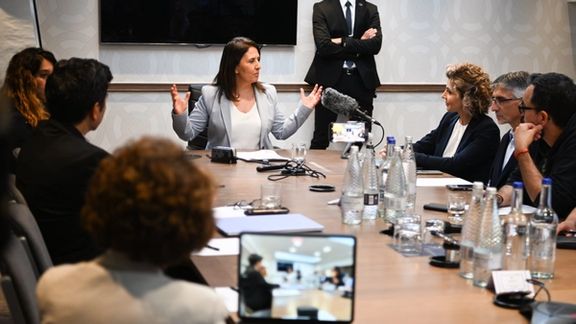
Israeli intelligence minister, Gila Gamliel, on Wednesday met Iranian journalists and activists in London, where she called on Iran’s opposition to unite.
She also was in the British capital to promote a campaign to sanction the IRGC as a terrorist organization. The meeting was unique because as a senior Israeli official she met with Iranian reporters and activists and she also said that she wants to put the focus on the IRGC, and convince European countries to sanction Iran's Revolutionary Guard, the IRGC.
The United States government sanctioned Iran’s Islamic Revolutionary Guard Corps as a Foreign Terrorist Organization in 2019, but European states have hesitated to take the step, although they have imposed many sanctions on IRGC officials and entities.
The Israeli minister said wishes to send “support messages to the Iranian people and that the West should be with the Iranians and not make it easy for the regime.”
She also talked about the importance of unity among the Iranian opposition figures and groups and how opinions should be respected and not be a reason for discord. The main goal should be against the regime, and this is the reason that she met with Prince Reza Pahlavi and she meets all kinds of opposition groups.
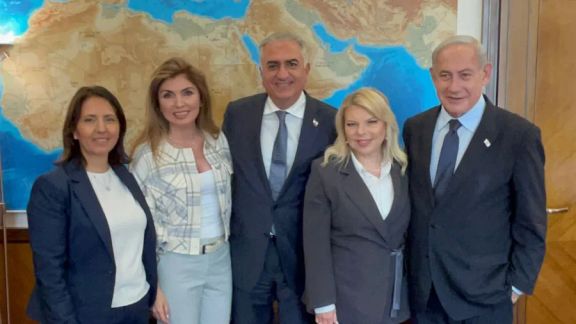
Iran’s exiled Prince Pahlavi made a historic trip to Israel in April, where Gamliel hosted him and his wife. Pahlavi also met Prime Minister Benjamin Netanyahu and Israelis of Iranian descent. At the time, the Israeli minister tweeted in Hebrew that "The visit of the Iranian crown prince that I led this week is only the beginning on the way to bringing hearts together and building bridges between the nations.“
Gamliel’s visit comes a little more than a week ahead of the one year anniversary of the Iranian regime’s murder of the 22-year-old Iranian woman Mahsa Amini, who was killed while in the custody of the notorious hijab police. The regime’s infamous morality police fatally wounded Amini for her alleged failure to properly wear her hijab.
Gamliel also issued two postings on X, formerly known as Twitter, about her meetings in London. She wrote an “important meeting with activists who are against the regime.” She noted the Iranian regime is not just a problem for Israel but for the entire world and Tehran spreads its weapons across the globe.
Gamliel also talked how the Islamic Republic is a murderous and violent regime. “The Iranian people and Israel should join hands and be united and solve the problem that bothers the world, “said the source about the minister’s comments. “She mentioned many Iranian victims in the protests, the children, the girls and many others.”
She stressed that “her goal is to change the opinions of leaders in the West so they go for sanctioning Iran and the IRGC. This is the reason that she meets a lot of leaders in the West, Italy, London and in the US.”
Gamliel wrote in the Israeli Maariv newspaper on International Women's Day in March, "The citizens of Iran are not Israel's enemies. Peaceful relations, respect and appreciation prevailed between the peoples for many years" before the Islamic Revolution in 1979.
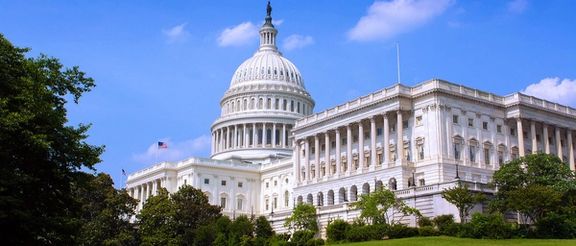
A US House of Representative subcommittee will hold a hearing next week to examine the Biden administration’s secret dealings with the Islamic Republic of Iran.
Subcommittee on National Security, the Border, and Foreign Affairs of the House Oversight Committee will hold the hearing titled “A Dangerous Strategy: Examining the Biden Administration’s Failures on Iran.” The session will examine “how the Biden administration has repeatedly engaged in secret negotiations with Iran, ignoring the emerging threats arising from Iran and its proxies.”
The hearing on September 13 “will also look at ways the Biden administration has fallen short in assisting Americans trapped abroad and circumstances around dismissals of high-level officials.”
This appears to be the first full-fledged examination of the administration’s Iran policy after several revelations since late in June that have worried many observers and the Iranian American community.
In late June, Iran International first reported that President Joe Biden’s envoy for Iran, Robert Mallay was put on unpaid leave after his security clearance was suspended and the case was being examined by the FBI. To date, the administration has remained silent about what the underlying reasons were for Malley’s suspension, while other officials continued to hold secret talks with Iran with the mediation of Oman and Qatar.
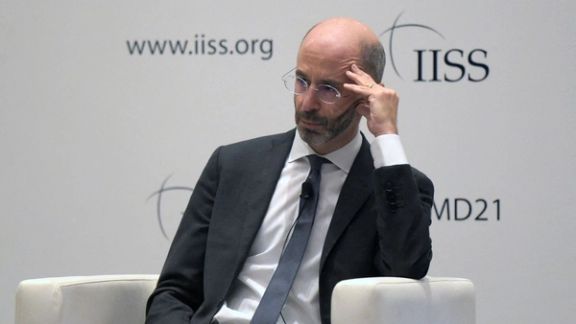
In August, it was announced that the United States had agreed to unblock $6 billion of Iranian funds frozen at South Korean banks, weeks after it allowed Iraq to unfreeze $2.7 billion.
At the same time, it was announced that Iran had released five American hostages form prison into house arrest pending the full release of its funds before they would presumably be allowed to leave the country.
Critics accused the administration of paying outright ransom for the hostages, while the deal still left two more prisoners behind.
The media have also reported that the Biden team is secretly negotiating with Iran over a partial, unofficial understanding to reduce Tehran’s high-level uranium enrichment. The UN nuclear watchdog, the International Atomic Energy Agency (IAEA) says that Iran has accumulated more than 120 kilograms of uranium enriched to 60 percent, which can be easily purified further to reach 90-percent, enough for up to five nuclear bombs. However, the pace of the enrichment has slowed down in recent weeks, giving credence to reports of a secret deal with Washington.
According to a 2015 INARA law, any administration trying to reach a nuclear agreement with Iran should keep Congress informed, which has the right to review the deal.
With the release of Tehran’s blocked funds and reports of more secret talks, Republicans in Congress began accusing the administration of potentially violating the Iran Nuclear Agreement Review Act of 2015 (INARA).
The Subcommittee on National Security is headed by Glenn Grothman (R-Wis.). At this point, details about the hearing and potential participants are not clear.
In announcing the hearing Rep. Grothman said in a statement, “The Biden administration’s foreign policy decisions regarding Iran continue to defy logic and are actively making Americans less safe at home and abroad. Despite promises, the Biden administration has failed to deliver transparency throughout negotiations…”
The Subcommittee Chairman went on to say, “The Iranian regime poses a great threat to American foreign interests and stability in the Middle East region and this hearing is a great opportunity to examine all these issues and provide Americans at home with what the Biden administration refuses to: transparency and answers.”
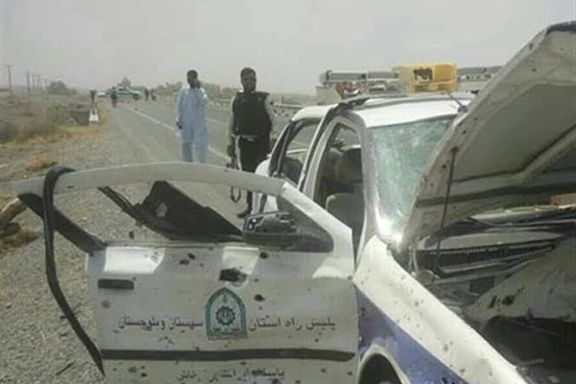
Two Iranian police officers, including a conscript, lost their lives when gunmen targeted their station in the city of Taftan, located in the restive Sistan and Baluchestan province in southeastern Iran.
The Iranian government labeled this attack as an act of terrorism while the gunmen responsible remain at large.
The Intelligence Organization of the Islamic Revolutionary Guard Corps (IRGC) and the Ministry of Intelligence issued a joint statement claiming the act was carried out by a network involved in "disruptive activities."
The statement, while lacking specific names or evidence, asserted that they had identified and targeted several members of the network, which it claimed had "financial support purportedly from the US Department of State.”
It also claimed members of the network had been providing free online training to activists in the women's and civil society sectors, both within and outside Iran, though there was no clear evidence given.
Furthermore, the intelligence organizations alleged that the group had recently conducted a training workshop for women's sector activists in May at a university in England with more planned this month, targeting civil activists and women in the online sphere with the intention to create more domestic uprising.
There have been reports of numerous attacks on military and government forces in the province in the past and since nationwide protests broke out in September 2022. The provincial capital Zahedan was the scene of a government massacre when around 90 citizens were gunned down during a protests September 30.

A Greek shipping company has pleaded guilty in the United States to smuggling sanctioned Iranian oil and agreed to pay a $2.4 million fine the Associated Press reported.
Documents unsealed by a US court made the case of tanker a seized by the US public part of the public record. US prosecutors acknowledged for the first time the government seized around one million barrels of Iranian crude from the tanker Suez Rajan.
The saga began in February when the advocacy group United Against a Nuclear Iran reported the tanker’s involvement in illicit transfer of Iranian oil in the South China Sea. For months, the vessel was stranded off the coast of Singapore and then it sailed for the Gulf of Mexico, in what appeared to be seizure of the oil by the United States.
For a while, the oil was not offloaded, as it was reported that US companies were reluctant to get involved presumably because of threats by Iran. In the meantime, the Biden administration was involved in behind-the-scenes negotiations with Tehran over the release of five American hostages and potentially an unofficial nuclear deal.
After Congressional inquiries about why the oil was not being unloaded, the process began August 20 off the Texas coast.
Since the Trump administration pulled out of the JCPOA nuclear deal in 2018 and imposed sanctions on the sale of Iranian oil, Tehran found ways to boost its illicit shipments using a fleet of tankers, often moving without identification signals, and transferring cargoes to other ships in Asian waters before delivery to China.
These shipments have increased during the Biden administration. According to the latest figures, Iran shipped close to 2 million barrels a day in August, close to pre-sanction days.
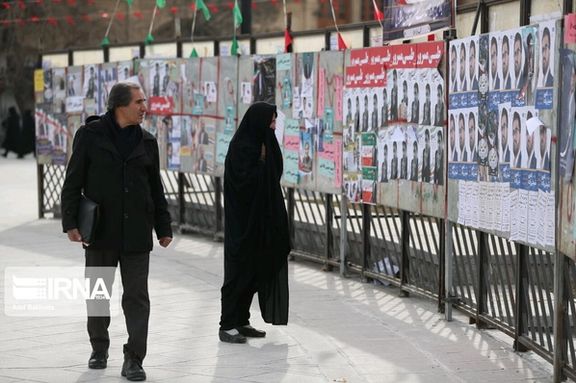
While Iranian conservatives aim to sideline reformists in the March 2024 parliamentary elections, there is a lack of consensus among them on many political issues.
The upcoming election, following a year of dissent and unrest, has left most voters indifferent, disheartened by disillusionment. There's a lack of clarity even among conservatives and hardliners about the number of seats they aim to secure. For instance, the Islamic Coalition Party intends to nominate 400 candidates for the 290 Majles seats, reflecting the overall apathy towards the election.
Hardline Conservatives have repeatedly said that they are keen to win the entire parliament, and reformists and moderates have often complained that the system does not allow them to run for the Majles or Presidency.
Although ultraconservative Paydari Party is doing everything to win the majority, Hamid Reza Taraqqi, a leading member of the Islamic Coalition Party said in an interview with Khabar Online that five different conservative coalitions have been formed ahead of the elections.
To make the situation look even more complicated for observers and the conservatives aiming for a full power grab, Taraqqi added that these five coalitions represent 10 different narratives. The main narrative, however, is to turn the Iranian political landscape into an all-conservative playground. All other sub-narratives try to prove that there are individual parties such as Paydari, which favor a non-elected Islamic government rather than the current Islamic Republic, or coalitions such as Sharian (Persian acronym for the Strategic Network of Friends of the Islamic Revolution) that wish to monopolize political power and financial privilege in Iran.
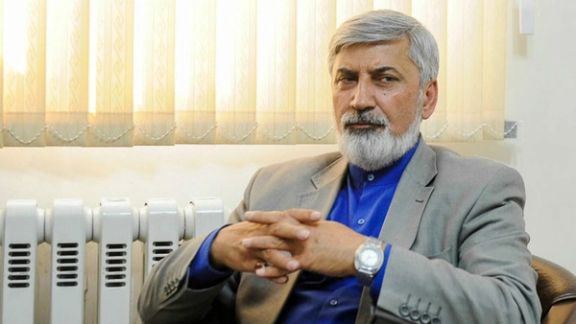
Sharian, led by Roads and Transportation Minister Mehrdad Bazrpash and former lawmaker Hamid Rasaei, seems to serve as an alternative route to the Majles for Paydari should their pro-Russia stance or lack of results in the current parliament render them unelectable.
Another group led by ex-Paydari politicians, including former President Mahmoud Ahmadinejad, and his aides Esfandiar Rahim Mashai and Hamid Baqaei is aiming to contest the Majles. Ahmadinejad himself is apparently preparing to run for the 2025 Presidential election. He has recently been criticizing the government's policy on hijab and purging dissident university professors.
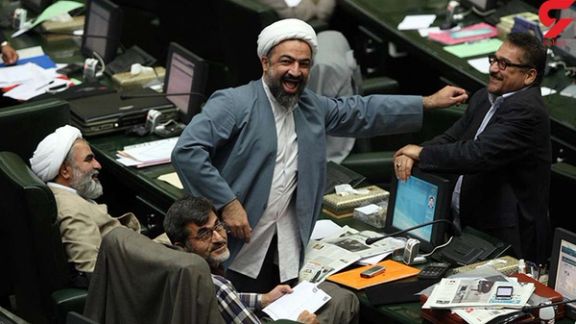
Besides these three ultraconservative groups, there is Majles Speaker Mohammad Bagher Ghalibaf's neo-con group, moderate conservative Ali Larijani, former Speaker, with his own list of candidates, and the traditional conservative Islamic Coalition Party. Disputes arise due to the refusal of these groups, except for the moderate-conservatives possibly joining reformists, to entertain power-sharing or compromise, adhering to the all-or-none approach within Iran's conservative camp.
This inflexible view leads to conflicts among the six groups. Differences between figures like veteran politician Haddad Adel and Bazrpash are evident. Additionally,
a report by the centrist Ham Mihan newspaper, which was also carried by many Iranian websites, indicates fierce competition between Ghalibaf and Bazrpash over who is Supreme Leader Ali Khamenei's favorite. According to Ham Mihan, three months ago Ghalibaf warned other conservatives not to mudsling against him as he was Khamenei's favorite.
And all this is happening while critics and even some insiders say that the Majles has lost its authority as most major decisions on domestic and foreign policies are made or endorsed by the heads of the three powers or the Expediency Council. Only 290 seats of debatable importance for so many parties and groups remind one of the Persian proverbs, "One raisin to feed 40 vagabond dervishes."






